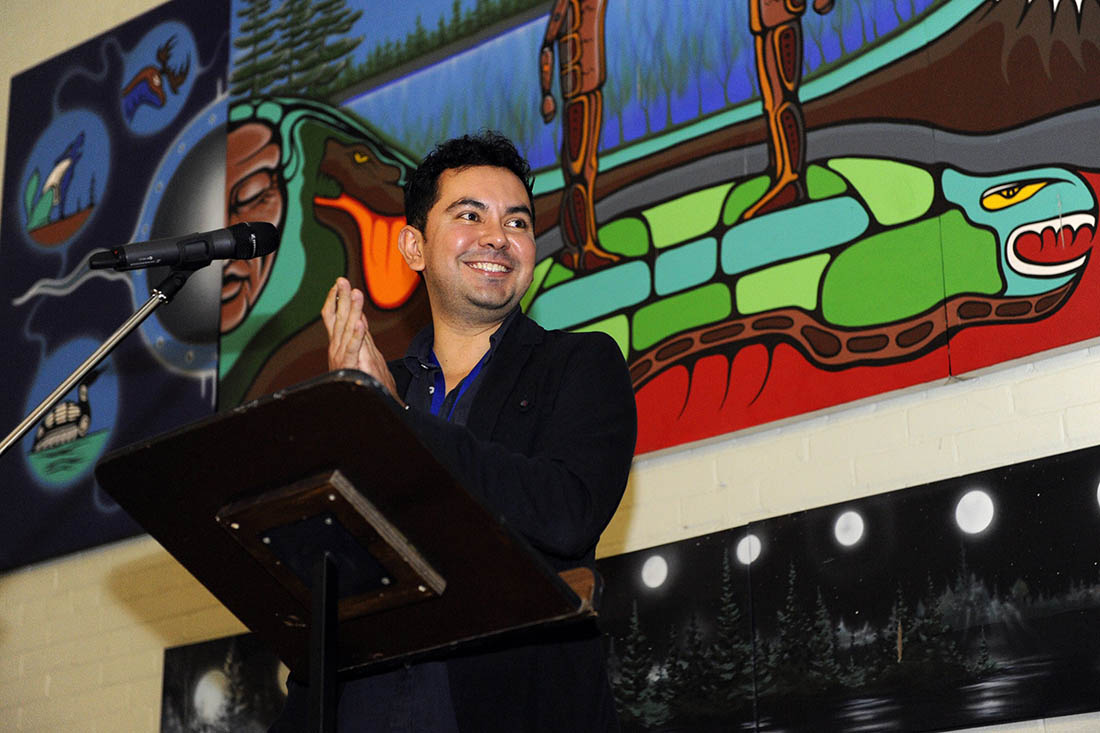Elle-Máijá Apiniskim Tailfeathers, actor, writer, director, producer (born in Cardston, AB). Elle-Máijá Tailfeathers is a renowned actor and filmmaker. She is a member of the Kainai Nation and the Sámi from Norway. In her sensitive portrayals of characters, and through the creation of innovative documentaries, narrative fiction and docudrama, Tailfeathers addresses the need for greater understanding and social justice.
Elle-Máijá Tailfeathers
Elle-Máijá Tailfeathers is a renowned actor and filmmaker who has worked both in fiction and documentary formats. She has won numerous awards throughout her career, including a Canadian Screen Award for Best Feature Length Documentary for her 2021
documentary Kímmapiiyipitssini: The Meaning of Empathy.
(Amanda Edwards/WireImage/Getty Images)
Early Days
Elle-Máijá Tailfeathers was born in the small town of Cardston, Alberta, near the American border. Her father, Bjarne Store-Jakobsen, is a journalist and activist who, in 2005, was elected to the Sámi Parliament of Norway, which represents the Indigenous Sámi people. Her mother, Esther Tailfeathers, is a member of the Kainai Nation and a physician who led the Alberta Health Services' Indigenous Wellness Core.
Elle-Máijá Tailfeathers grew up in Norway and, after her parent’s divorce, back in Canada. Following her secondary school graduation, Tailfeathers moved to Vancouver with a desire to become an actor and filmmaker. She believed it might be impossible for an Indigenous woman to do so, later saying, “You can’t really become what you don’t see.” Her confidence grew, however, after earning a First Nations and Indigenous Studies and Gender, Race, Sexuality and Social Justice Studies Bachelor of Arts degree at the University of British Columbia in 2011.
Acting
Elle-Máijá Tailfeathers’ first acting role came in 2008 with the TV movie Another Cinderella Story. She followed this role with a number of TV and short film roles before starring in the 2016 movie Unclaimed, which was called On the Farm when released. She co-starred in the 2019 horror movie Blood Quantum. She also played roles in the movies Night Raiders (2021), Stellar (2022) and Sweet Angel Baby (2024) as well as the TV series Three Pines (2022).
Filmmaker
While at the University of British Columbia, Elle-Máijá Tailfeathers made her first film, called Bloodland. She submitted it to the 2011 Vancouver International Film Centre and to the imagineNATIVE Film + Media Arts Festival, where it was positively reviewed. She became convinced that she wanted to become a filmmaker and storyteller in order to contribute to a greater understanding of, and respect for, the Kainai and Sámi peoples.
Her diverse interests and energy were demonstrated in 2012, when she wrote and directed A Red Girl's Reasoning, addressing racially motivated sexual violence, and then co-wrote and co-directed Colonial Gaze: Sámi Artists’ Collective. It used dark comedy to explore the cultural relevance of Sámi art.
Tailfeathers explored her father’s experience in Norway’s residential school system in the 2014 film Bihttoš (Rebel). The documentary employed archival photos, animation and re-enactments to delve into her relationship with her father while ruminating on the importance of love and family. The film was shortlisted for the Canadian Screen Award Best Short Documentary Film and as one of the Toronto International Film Festival’s Ten Best films of the year.
Elle-Máijá Tailfeathers Speaking at the Toronto International Film Festival
Elle-Máijá Tailfeathers has participated in multiple film festivals during her career, including Hot Docs, Vancouver’s DOXA Documentary Film Festival, the imagineNATIVE Film + Media Arts Festival and the Toronto International Film Festival.
(George Pimentel/Getty Images)
Tailfeathers won a Vancouver Mayor’s Arts Award and a Kodak Image Award for her work in bringing light to the need for social justice. In 2018, she won the Sundance Institute’s Merata Mita Fellowship for Indigenous Artists. In accepting the award, she observed that her filmmaking is “a form of nonviolent direct action against issues like violence against women and degradation of Indigenous land.”
In 2019, she starred in and, with Kathleen Hepburn, co-directed the drama The Body Remembers When the World Broke Open. The film explored sexual violence, racism and intimate partner violence. An international reviewer called the film “as urgent and unpretentious as it is remarkable” and observed that, as an actor, she brought to her character “grace, empathy and a touch of wistfulness.” At the 2020 Canadian Screen Awards, Tailfeathers and Hepburn won the Achievement in Direction and Best Original Screenplay. CBC listed it as number 30 in the 50 Greatest Films Directed by Canadians.
In 2021, Tailfeathers directed Kímmapiiyipitssini: The Meaning of Empathy. The documentary showed the effects of the opioid crisis among those of the Kainai Nation. She wanted the film to counter “misrepresentations of our community in the media that were often…sensationalizing the crisis through a lens of tragedy rather than showing the strengths of my community and all of the hard work that was happening on the front lines.” The film was among five winners of the Rogers Audience Award at the Hot Docs Canadian International Documentary Festival and won the Colin Low Award for Best Canadian Director at Vancouver’s DOXA Documentary Film Festival. Tailfeathers also won the Emerging Canadian Filmmaker Award at Hot Docs in 2021. Additionally, Kímmapiiyipitssini: The Meaning of Empathy also won the Canadian Screen Award for Best Feature Length Documentary.
NFB Pause with Elle–Máijá Tailfeathers, Simon Rouillard, provided by the National Film Board of Canada
Tailfeathers directed the first three episodes of the series Little Bird, which addressed the Sixties Scoop, in which Indigenous children were taken from their homes and placed with non-Indigenous families. She saw the stories as important in bringing people’s attention to the continuing overrepresentation of Indigenous children in Canada’s foster care system.
Tailfeathers is an important part of the growing movement of narrative sovereignty in which Indigenous voices are telling Indigenous stories that all should hear.

 Share on Facebook
Share on Facebook Share on X
Share on X Share by Email
Share by Email Share on Google Classroom
Share on Google Classroom





